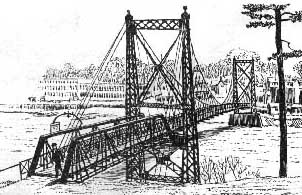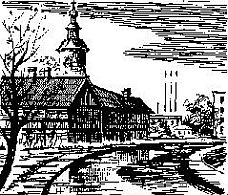|
Home > About Kotlas > History > Gulag > Two Memoirs
Life in the Gulags of Kotlas:
Excerpts from Two Memoirs
One can't read these lines without getting upset. The author of the story "Sinking Into Darkness", Oleg Volkov, in passing through the system of gulags, drank his full cup of bitterness, as the saying goes. In the other work "In a Closed Circle", by K. Malanov, the story is about the fate of Damdin Tsydenko. We cite here only short excerpts from these memoirs, which at last have been published. But even reading only a few lines is sufficient, I think, to get some picture of the life full of deprivations and grief in the Stalinist "guest houses", located in these cases in the Kotlas Gulag.
Conditions were indeed difficult. There were vastly more people sent to the Kotlas Transit Prison than it was able to send out to the camps. There weren't enough [river] cutters or barges, but the railroad, with its own meticulous schedule, kept throwing out more and more groups. They were formed into marching convoys, but there weren't enough guards.
People lived constantly watching for a free space on the bunks in order to catch a little sleep. Meanwhile they paced back and forth in the barracks or, wet and shivering under the persistent rain, in the yard, which was surrounded with barbed wire. When food was given out — bowls of bad soup for dinner, hot water and bread in the mornings — it was an unimaginable scene. Although we all were divided into companies with brigadiers and supply clerks, nevertheless when the time came the whole deportee population came down on the distributors. No shouts or curses could bring order. The guards didn't get involved at all: they just watched out to see that nobody got nearer than was allowed to the forbidden zone, and twice a day they lined everybody up for a roll call.
They brought me to Kotlas on a nice sunny day, which in part colored my first impression, and after Kemperpunkt [the Kem Transit Camp, northeast of Archangel] the sight of the towers, of the cleared area bounded by barbed wire, of the dark buildings within, couldn't faze me. But then the closeness and the confusion put me on guard: I could be staying here for an indeterminately long time. The bad reputation of the Kotlas transfer prison was very well established, and I would have to find a way to keep myself from being crushed by the conditions there.
I got some help from the camp medic, a Volga German whom I often visited in the sickroom, a narrow kennel blocked off from the rest of the barrack and furnished with a couch bed, a stool and a little table covered with a dirty towel. He dispensed powders, sodas, stuck a thermometer, so dirty that it felt rough, under the arm of the patients and, in general, sensibly declared all of them well, since there was no medicine, nor any possibility of putting them in the minuscule hospital which was stuffed to the brim.
This Peter who found himself stuck in Kotlas put me in contact with the work assigner; he, in turn, talked it over with someone in the office. It was agreed that I and those of my comrades who wanted would be entered into the rosters of the next shipment of prisoners going to Ust-Vym, whence we would be ferried to Knyazhpogost and to Chibya.
And one day, luckily a warm and clear one, they sent me out "with my things" to the checkpoint. Beside it, on the other side of the restricted zone, the convoy was waiting.
We passed through Solvychegodsk; then we passed Yarensk.
Traveling down the Vym [a tributary of the Vychegda] didn't leave any special impressions. Already in a day or two they unloaded us at Knyazhpogost, a camp serving as the headquarters for the construction of the railroad.
O. Volkov
Misfortune fell unexpectedly, like snow upon his head. That he would find himself behind the stinging barbed wire of a concentration camp, such a thing Damdin Tsydenko didn't expect even after his arrest, as he considered it all some kind of foolish mistake. Now this log barrack with bunks made from poles, old straw instead of mattresses, and dilapidated cloth blankets, had become his home.
The situation there was noisy and unstable. After his arrest he managed to see a thing or two a little more sharply. . . . Damdin Tsydenko was not simply living in this barrack, he was, together with others, building a railroad between Kotlas and Vorkuta.
Along side him were many thousands of prisoners. Whom all didn't he see here! People who were well known in the past, people of merit, toiled on an equal footing here: scholars, leading Party and Soviet workers, military men of almost all ranks, directors of large industrial enterprises, everyday workers and kolkhoz [collective farm] workers, former landowners, and servants of the cult. Among them circulated criminal offenders — petty thieves, major plunderers of government property, murderers, and prostitutes of all colors. They all had the same first name — internee. They were all cut off from the external world by the barbed wire.
Along this barrier and in its corners — guard towers with machine guns. The whole territory of the camp was quite visible from them. A mouse couldn't run across without being noticed.
Here no one was supposed to sit with folded hands. There was work for everyone. It was varied, but the main task was building the railroad. Its path was set out through the most inhospitable places — swamps. It went far into the distance, disappearing somewhere beyond the horizon. Along its whole length people swarmed, like ants, raising the bed of the future road with the help of wheel barrows and shovels. Some laid heavy wooden ties on it, while others placed steel rails on the ties, securing them with iron spikes.
Tsydenko had never done any work like that. But where could he hide from it? To refuse to work was not acceptable there. He, like all the others, was considered an enemy of the people. Every time that he looked at the countless crowd of prisoners he thought: could it be that the Soviet government has so many enemies within the country?
K. Malanov
The two preceding passages and the italicized introduction were taken from the pamphlet "Gulag in the North", published by the Archangel chapter of Sovest ("Conscience") in 1991.
Top • Intro • Next —>
|



